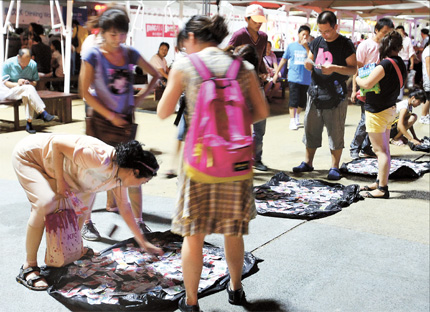Cost of living hikes spur outpouring of street vendors
Songjiang University Town, a student suburb on the fringes of Shanghai, is known as a good place to find bargains.
 |
|
Street vendors hit a street in Shanghai, attracting bargain-hunting buyers. |
Yet even here, the rising cost of living is biting. That's spawned a big increase in the number of street vendors pitching prices much lower than in supermarkets and small stores.
The vendors typically hit the streets after 5pm, when sunlight is fading and the area's urban monitors are off work and hurrying home.
The stalls occupy the whole of Wenhui Street where thousands of university students live. The vendors sell a wide variety of goods: fruit, fake UGG shoes, pajamas, silk stockings and handicrafts.
A pair of silk stockings there costs about 5 yuan (73 US cents), while pajamas fetch about 25 yuan and a pair of shoes will set you back 30 to 50 yuan.
Prices for the same goods at nearby stores would be between 20 percent and 40 percent higher because retailers have to pay rent and vendors don't.
The vending stalls are popular, especially among female students who often swarm to the streets with friends after school, making the sidewalks almost impassable.
Many of the stall vendors come from Hangzhou in Zhejiang Province and towns in Jiangsu Province outside Shanghai. They bring cheaper goods from those outlying areas.
Some of the vendors are even college students trying to make some extra money to make ends meet.
"I'm not expecting to get rich via this small business," said one female student selling silk stockings. "I only want to earn some pocket money."
Another vendor selling hand-made pottery mobile phone accessories told Shanghai Daily that making money was secondary to his goal of demonstrating his skills and proving that he could make a living with his hands.
The mobile phone accessories, created in various colorful cartoon images, cost 5 yuan each and attract a lot of female students because they aren't available in regular stores.
There are problems, of course, buying from vendors. No receipts are given and buyers have no recourse if the goods they buy turn out to be shoddy.
Yang Xiaoxiao, a graduate student of Shanghai International Studies University, told Shanghai Daily that she once bought a packet of apples from one of the stalls at 6 yuan per kilogram ? 4 yuan cheaper than in fruit shops.
But when she got back to her dormitory, she found the apples rotted in just a day. She suspected the stall vendor was selling apples that had been previously frozen for a long time.
"When I went back to the vendor to demand my money back, he denied ever selling them to me," said Yang.
 0
0 






